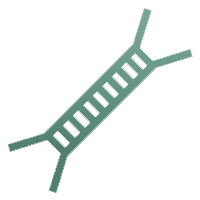m7G MeRIP Sequencing
m7G-methylated RNA immunoprecipitation sequencing (m7G MeRIP sequencing) is a next generation sequencing (NGS)-based method to comprehensively detect m7G, an RNA methylation modification that exists in various transcripts. Our m7G MeRIP sequencing service is dedicated to detecting and analyzing m7G RNA modification in a sample, providing a powerful tool for research of intracellular translation, regulation and protein modifications.
Overview
N7-methylguanosine (m7G), present at eukaryotic mRNA 5’ caps and at defined internal positions within tRNAs and rRNAs, is an essential positively charged modification in eukaryotes. It is involved in regulating nearly every step of the life cycle of mRNA such as mRNA export, translation, and splicing. Besides, m7G can regulate miRNA biosynthesis and biological functions, tRNA stability, and intracellular processing and maturation of 18S rRNA. As a new type of RNA methylation modification, m7G RNA methylation is a hot spot in epigenetic transcriptome. Accurate identification of the m7G sites in transcriptome will provide insights into its biological functions and mechanisms. m7G MeRIP sequencing is a high-throughput sequencing method based on antibody immunoprecipitation. It can quickly generate the complete transcriptome-wide picture of internal m7G methylome in biological samples from different sources. The technique uses an m7G-specific antibody to grab methylated modified fragments for library preparation and carries out high-throughput sequencing and peak localization for m7G modified fragments. Our experienced technical team can comprehensively detect m7G methylation modification levels of various RNA molecules such as mRNA, lncRNA, pri-miRNA, tRNA and rRNA, and provides professional and in-depth data analysis of m7G RNA methylation.
| High Coverage | High Efficiency | Professional Team | One-stop Service |
|---|---|---|---|
| Comprehensively detect m7G sites of multiple RNA molecules. | Adopt carefully optimized experimental procedures, achieving high efficiency and specificity. | Provide various in-depth data analysis to satisfy customer needs. | Provide one-stop service for library construction, sequencing, sample QC and data analysis. |
Project Workflow

1. Sample Preparation
RNA purification; quality assessment and quantification

2. Library Preparation
RNA fragmentation; immunoprecipitation; m7G library preparation.

3. Sequencing
Illumina HiSeq; PE 50/75/100/150.

4. Data Analysis
Visualize and preprocess results, and perform custom bioinformatics analysis.
Bioinformatics Analysis Pipeline

In-depth data analysis:
- Peak calling and visualization
- Peaks annotation
- Transcriptome-wide profiling of m7G methylation
- Differential binding analysis
- Motif search of enrichment sites
- Evolutionary conservation analysis
- GO and KEGG pathway analysis
Sample Requirements
RNA sample: quantity ≥ 300 ug.
Please make sure that the RNA is not significantly degraded.
Sample storage: RNA can be dissolved in ethanol or RNA-free ultra-pure water and stored at -80°C. RNA should avoid repeated freezing and thawing.
Shipping Method: When shipping RNA samples, the RNA sample is stored in a 1.5 mL Eppendorf tube, sealed with sealing film. Shipments are generally recommended to contain 5-10 pounds of dry ice per 24 hours.
Deliverable: FastQ, BAM, coverage summary, QC report, custom bioinformatics analysis.
References:
- Zhang L S, Liu C, Ma H, et al. Transcriptome-wide Mapping of Internal N7-Methylguanosine Methylome in Mammalian mRNA. Mol Cell, 2019, 20, 74(6): 1304-1316.
- Pandolfini L, Barbieri I, Bannister A J, et al. METTL1 Promotes let-7 MicroRNA Processing via m7G Methylation. Mol Cell, 2019, 20, 74(6): 1278-1290.
- Wei C, Pengmian F, Xiaoming S, et al. iRNA-m7G: Identifying N7-methylguanosine Sites by Fusing Multiple Features. Mol Ther Nucleic Acids, 2019, 6, 18: 269-274.



